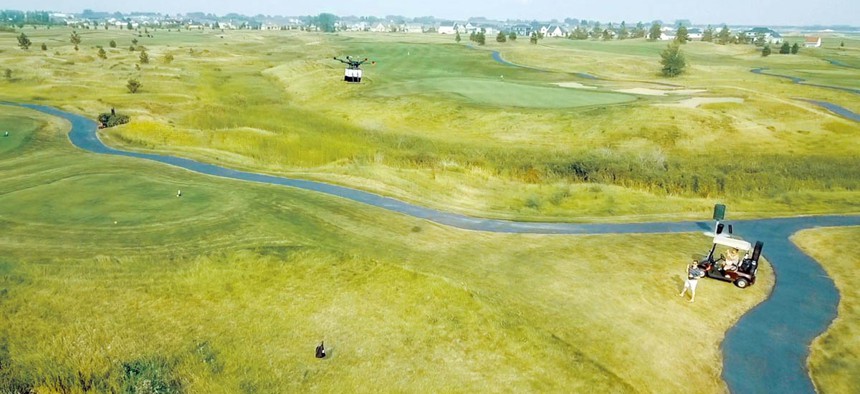There’s Finally a Perfect Use for Drone Delivery

Flytrex
Burgers and beers take flight.
Forget delivering Amazon packages. Forget search and rescue. Forget saving lives.
The most useful application of drones and their ability to autonomously transport things through the air is finally here. A golf course in North Dakota, in partnership with the Israeli startup Flytrex, has bought drone deliveries of much-needed burgers and beers to the links.
Starting Wednesday, Sept. 5, Flytrex will deliver food and drink from the restaurant at the King’s Walk golf course outside of Grand Forks to golfers on the course. Gone are the days of waiting and hoping for the bar cart to show up before you get lost in the deepest recesses of the golf course. With Flytrex’s system, golfers can order and pay for food through a custom-built app, which will then be prepared in the kitchen and loaded into a drone. Staff press a button and the drone will take off and fly to the golfers on its own, lowering down the food on a wire when it gets to a designated delivery area around the course.
OK—perhaps it’s not the most important use of this burgeoning technology—others are using drones to deliver life-saving medicine and to make deliveries to hard-to-reach areas—but it signifies a shift in the drone industry. Thanks in part to advancements in technology and loosening regulations in countries like the US, more companies are testing out new, novel commercial applications for drone deliveries.
And Flytrex is operating beyond just golf courses. Last year, it started a pilot program in Iceland to deliver food to the suburbs of Reykjavík. CEO Yariv Bash told Quartz that the company is scaling up its operations in the city, with plans to deliver to 14 different locations across the area, effectively covering half the city. It’s still focusing on open areas where it’s easy to land drones or drop packages. “We don’t want you climbing onto your rooftop,” Bash said.
Flytrex plans to be able to deliver to private residences’ back yards in the near future, taking on delivery services like UberEats or Grubhub, whose unit economics start to break down when they expand to less-dense suburban areas and delivery times per order increase. Bash suggested the aim of its early operations is to curtail any concerns about drone deliveries with the time savings people are likely to see. “What do you want: sushi in an hour to the front door, or sushi at the back door in 20 minutes?” he said.
In North Dakota, Flytrex is working with the King’s Walk golf course to operate its service, but it provided a complete solution to Aha, an Icelandic food-delivery company, for its deliveries in Reykjavík. It offers various levels of managed services for different operations, ranging from $25 to $600 per month.
The company is also beginning to work with the state of North Carolina to bring drone delivery to the suburbs of Raleigh, as well as other golf courses around the US. But for now, if you want a cold brew delivered by a flying robot, you’ll have to head to the northern state that is covered in honey bees.
NEXT STORY: The Online Gig Economy’s ‘Race to the Bottom’





